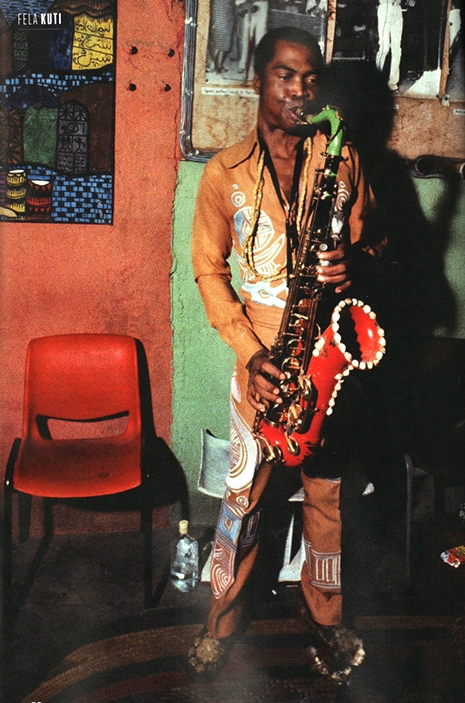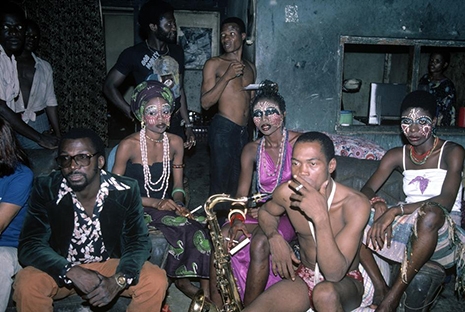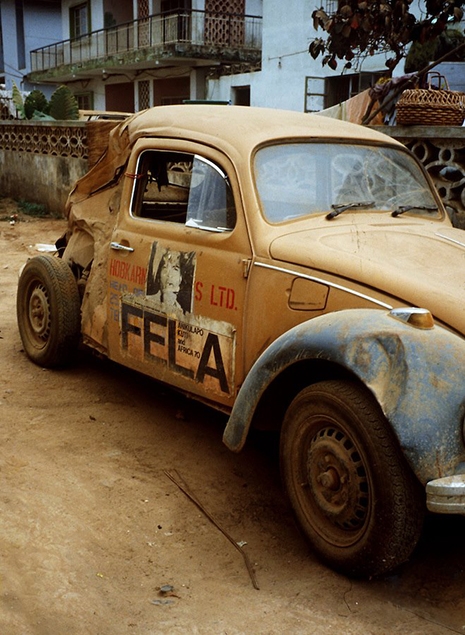
Musical visionary, street preacher, incendiary political activist, and Afro-beat progenitor, Fela Anikulapo Kuti is chronicled in Fela Kuti – Music is the Weapon, a compelling 1982 documentary directed by Stéphane Tchal-Gadjieff and Jean Jacques Flori. The film documents all-night politically charged performances at Fela’s Shrine nightclub, intimate takes from inside his Kalakuta Republic compound, and scenes of street culture in Lagos, Nigeria. It’s not a complete picture by any means, but it’s a singular and important historical record capturing Kuti in stage and home milieus that were vital to his life and work. If you had any doubt that Fela Kuti was anything short of an otherworldly human being, this film and these performances will dispel that belief quickly. As he did often in his music, Fela speaks out repeatedly against the Nigerian government throughout the film while discussing his political and musical ambitions.
Kuti’s attitude is defiant from the get-go. He takes command in the very first on-screen moment, saying “When you are the king of African music, you are the king. ‘Cause music is the king of all professions.”

Almost immediately it becomes apparent upon watching the film that life can be unforgiving in the place where Fela and crew choose to make their home base. Lagos, Nigeria is depicted as being the most dangerous and violent city in the country and, by extension, the world. Street scenes portraying the chaos, desperation and the day-to-day existence of citizens in and around the former Nigerian capital are beautifully shot. Scenes of poverty, humor and violence along with shipwrecks and scrapyards of decaying cars and motorcycles are interspersed with vibrant local markets. One chilling scene shows the body of a man washed up on a popular beach, a regular occurrence according to the film’s narrator.
In these surroundings Fela Kuti arrives nightly around midnight to his famous Shrine to unleash a combination of music, spiritual ritual, and personal political testimony. The performances captured in Music is the Weapon are magical things, encompassing dance, classic Afrobeat call-and-response and charismatic displays from Kuti himself who plays baritone sax and keys and often performs in nothing but his briefs. The vibrancy of Kuti’s work is obvious through his myriad recordings but it’s even more potent when you can see it radiating from what was ground zero for Kuti’s entire transcendent enterprise.

Inside The Shrine
Some of the most illuminating scenes take place off the stage. One notable sequence begins early in the morning, when “day breaks and the music stops,” and Fela and crew leave in a beat-up van and a rickety VW Beetle and The Shrine is left empty for the day. The band, looking like they could play for a few more hours if they felt so inclined, return to a ramshackle Kalakuta Republic compound where Fela lived with his controversial bevvy of “queens” and fellow musicians. At the time of the filming, Fela had been there for several years despite repeated attempts by the Nigerian government to intimidate him with shows of force, one of which tragically led to the death of his mother years earlier. One such incident actually takes place in 1981during the filming of Music is the Weapon and is documented with still photographs taken by the camera crew who didn’t have time to set up their movie cameras. Nigerian soldiers surround the compound, fire tear gas and brutally beat the occupants. Kuti finds himself in prison on trumped up charges but is soon released and is right back at it on stage within days at The Shrine, despite the fact that it was supposedly closed by Nigerian officials.

A car fit for a king.
Despite repeated jail sentences and years of beatings, persecution and all nature of mistreatments leveled upon him, Fela comes across again and again in Music is the Weapon as a not-from-this-world, heavy, unstoppable force attempting to live a life of pure principle where politics, spirituality, music and activism are indivisible.
Ultimately, Fela Kuti’s legacy is far larger than what could be captured in a short film, but this is an informative introduction to the Pan-African pioneer’s life and work.
Says the anti-colonialist visionary at one point in the film:
Music is a spiritual thing. You don’t play with music. If you play with music you will die young. See because when the higher forces give you the gift of music, musicianship, it must be well used for the good of humanity. If you use it for your own self by deceiving people… you will die young, you see. And I’ve told people this many times. So, I’m gonna prove them all wrong and prove myself right. Because now I’m 44, I’m getting younger. Because I’m doing it right. I can play music for ten hours and never tire. I’m getting younger because the spiritual life of music that I’ve led, RIGHTLY, is helping me now.
Kuti was the subject of a Toni Award winning Broadway production called Fela! from 2008 and of a recent 2014 documentary called Finding Fela.
You can watch all of Fela Kuti – Music is the Weapon below. It’s also streaming on Hulu Plus.
Previously on Dangerous Minds:
Dozens of Fela Kuti albums available for free streaming
Fela Kuti live at Glastonbury Festival 1984